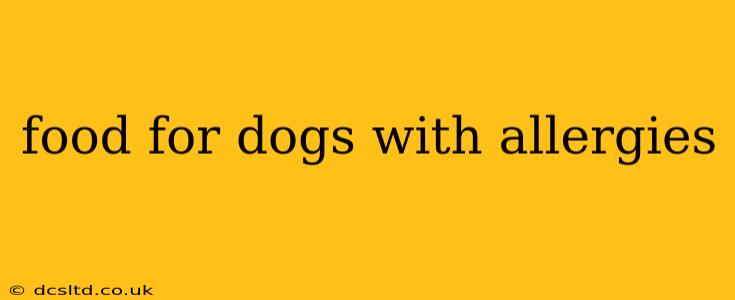Dealing with a dog allergy can be challenging for both you and your furry friend. Itching, digestive upset, and skin problems are common symptoms, making it crucial to identify the culprit and switch to an appropriate diet. This comprehensive guide will delve into the world of dog food allergies, helping you understand the causes, symptoms, and most importantly, the best food options for your allergic dog.
What Causes Food Allergies in Dogs?
Food allergies in dogs arise when their immune system mistakenly identifies a specific protein (or sometimes carbohydrate) in their food as a threat. This triggers an allergic reaction, manifesting in various symptoms. Common allergens include beef, dairy, chicken, wheat, soy, corn, and eggs. The severity of the reaction can vary greatly depending on the dog and the allergen. It's important to note that food sensitivities (intolerances) are different from allergies. Sensitivities cause digestive upset but don't involve the immune system.
What are the Symptoms of Dog Food Allergies?
Recognizing the signs of a food allergy is crucial for timely intervention. Symptoms can range from mild to severe and might include:
- Skin issues: Itching, scratching, redness, hot spots, hair loss, and skin infections are common indicators.
- Digestive problems: Vomiting, diarrhea, gas, and changes in bowel movements.
- Ear infections: Frequent ear infections can be linked to food allergies.
- Respiratory issues: In some cases, food allergies can cause coughing or sneezing.
What Kind of Food Should I Feed My Dog with Allergies?
Choosing the right food for a dog with allergies requires careful consideration. Here’s a breakdown of options:
1. Limited Ingredient Diets (LID): These diets contain a minimal number of protein and carbohydrate sources, making it easier to pinpoint the allergen. Look for foods with a single novel protein source (one your dog hasn't eaten before), such as venison, rabbit, or duck, paired with a simple carbohydrate like sweet potato or brown rice.
2. Hydrolyzed Protein Diets: These diets use proteins that have been broken down into smaller peptides, making them less likely to trigger an allergic reaction. The smaller protein fragments are less recognizable to the immune system.
3. Novel Protein Diets: As mentioned above, these diets utilize protein sources your dog hasn't encountered previously. The idea is to introduce a protein the immune system is unfamiliar with, reducing the likelihood of an allergic response.
How Do I Determine What My Dog is Allergic To?
Pinpointing the exact allergen can be challenging. Working closely with your veterinarian is crucial. They may recommend an elimination diet, gradually introducing different ingredients to identify the culprit. This process requires patience and careful observation of your dog's reactions. Allergy testing, while available, isn't always conclusive for food allergies.
Can I Use Home-Cooked Food for My Dog's Allergies?
While home-cooked meals can be an option, it's vital to ensure the recipes are nutritionally balanced and tailored to your dog's specific needs. Consulting with a veterinary nutritionist is highly recommended to avoid nutritional deficiencies. Home-cooked meals need careful planning to ensure adequate levels of all essential nutrients.
What About Treats and Supplements?
Remember to carefully consider treats and supplements as well. Many contain common allergens. Opt for treats made with limited ingredients and those that align with your dog's elimination diet.
Are there any Specific Brands of Dog Food Good for Allergies?
Several reputable brands specialize in hypoallergenic dog food. However, it's crucial to choose a diet based on your dog's specific needs and sensitivities rather than focusing solely on brand names. Your veterinarian will provide recommendations tailored to your dog’s specific condition.
This guide provides a starting point for navigating the complexities of dog food allergies. Remember, always consult with your veterinarian before making any significant changes to your dog's diet. Their guidance will ensure your dog receives the proper nutrition and management for their allergy. Early intervention and careful monitoring are key to helping your dog live a happy and healthy life.
